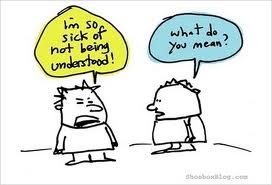
When couples are asked what it is in their relationship that makes them feel fulfilled, the answer is inevitably that they feel “understood and cared about”. Contrary to what many of us believe, having misunderstandings is not the problem in our relationships. It is not having a misunderstanding that is what creates bad feelings and unhappiness in relationships, but rather not feeling that the person we are most intimate with and care most deeply about doesn’t understand who we are and what we are feeling.
In order to feel loved we must first experience that others understand us and regard us as good and valuable human beings. If our significant others do not understand or get who we are and how we feel, that leaves us with a feeling of being misunderstood. It can also lead to our feeling alone because only someone who truly knows us, rather than just thinking they know us, can truly love us for who we actually are.
When we are in a relationship we do not want to continually explain ourselves to another person, or justify our values, beliefs or the choices we make in our lives. If after a time, that person cannot be really present to us, listening to what we have to share and sharing their own thoughts and feelings, the relationship quickly deteriorates. This is why one of the important focal points in good couples counseling is learning what is called “active listening.”
The main purpose of active listening is to let your partner know that you are truly listening to them and that you are really “present” to them as well – that means they have our full attention. And by giving them our full attention, we can more authentically understand how they feel and what their point of view and opinions are about the important discussions that make up all relationships.
A key component of active listening is when we reflect back to the other person what we understand they were communicating to us so that we can be sure that we understand and not mis-interpret their communication. When we do this, we ask questions to clarify, such as “Are you saying that you were upset that I did not go to your aunt’s house for dinner on Sunday, even though you had said it didn’t matter if I went or not?”
By working together so that the listening partner and the speaking partner both understand that clarifying their understanding of what is being communicated and also participating in active communication as well as active listening, the relationship can take on a greater depth, intimacy and fulfillment. Effective communication is always the key to any good relationship. For a free chapter download from the award winning, Changing Behavior, visit changingbehavior.org.
